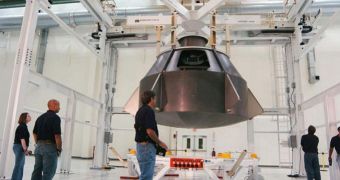According to officials at Lockheed Martin, the corporation is currently developing an action plan that would see the first Orion space capsule being launched as soon as 2013. The test would see the Crew Exploration Vehicle taking off unmanned, so that experts can test all of its systems.
At this point, Lockheed Martin Space Systems has already entered discussions and negotiations with the United Launch Alliance (ULA), a cooperative initiative between Lockheed Martin and Boeing.
The talks revolve around LMSS buying a Delta 4 Heavy launch system, on which to test Orion as soon as 2013. The company plans to press ahead with its plan even if the American space agency has not yet pledged to fund the demonstrations flight.
The general view at Lockheed is that the company simply does no have the time to wait for NASA to finish its ongoing review of the costs and purposes associated with the Orion capsule. The process is ongoing, and it will most likely take a year or so to complete, Space reports.
In late September, Congress passed the NASA Authorization Bill, in which it called for the development of a space capsule – heavy-lift delivery system for carrying astronauts beyond low-Earth orbit (LEO) by 2016.
“If we're going to meet the 2016 flight date specified in the authorization bill, we have to have a test flight in 2013,” said on November 23 the vice president of Lockheed Martin business development for the Orion program, John Stevens.
He added for Space News that the company needs to have at least a couple of years available to conduct additional tests and conduct calibrations following the first test flight of the new capsule.
“So we've put our money down on this so we can reserve the launch slot for a 2013 test, because that's what's required to meet the 2016 date that Congress has set,” Stevens explained in the interview.
The corporation is developing Orion under a $3.9 billion contract with NASA, which it snagged from under the noses of L.A.-based Northrop Grumman and Boeing, back in 2006.
When Obama presented his new space plans at the beginning of this year, he called for project Constellation to be canceled. This included the ARES rocket family, the Orion capsule, the Altair lunar lander and the Earth-departure stage (EDS).
In April, the President acknowledged the development of the Orion project, and proposed it be used as a crew lifeboat on the International Space Station (ISS), relieving the currently-used Soyuz capsule.
NASA, the space industry and Congress resisted this proposal, which was more of a political concession than an actual need. Under the final draft of the NASA Authorization Act, Washington called for the development of a multipurpose crew vehicle (MPCV).
This spacecraft is to ready by 2016, and it must be capable of carrying astronauts to LEO and beyond.
“Much of the [work] related to MPCV can continue under the existing contracts, but, as appropriate, NASA will be conducting acquisition strategy meetings to determine if other steps are needed to meet the MPCV scope, requirements and major test objectives,” Michael Braukus said.
“At this juncture, NASA does not anticipate specifying a particular vehicle to the contractor; the Agency will focus on meeting the major test objectives,” added the NASA spokesman in a November 19 email.
But Stevens says that his corporation's move to acquire a launch vehicle on its own is in tune with the presidential proposal, and that, if anything, it should make work easier should NASA decided to fund the further development of Orion.
“That's part of the new paradigm – we're supposed to have skin in the game. We are running at risk, to a limited extent, hopefully, but then again, that's what doing this in a quasi-commercial fashion means,” he adds.

 14 DAY TRIAL //
14 DAY TRIAL //